Why Metro needs its own police force
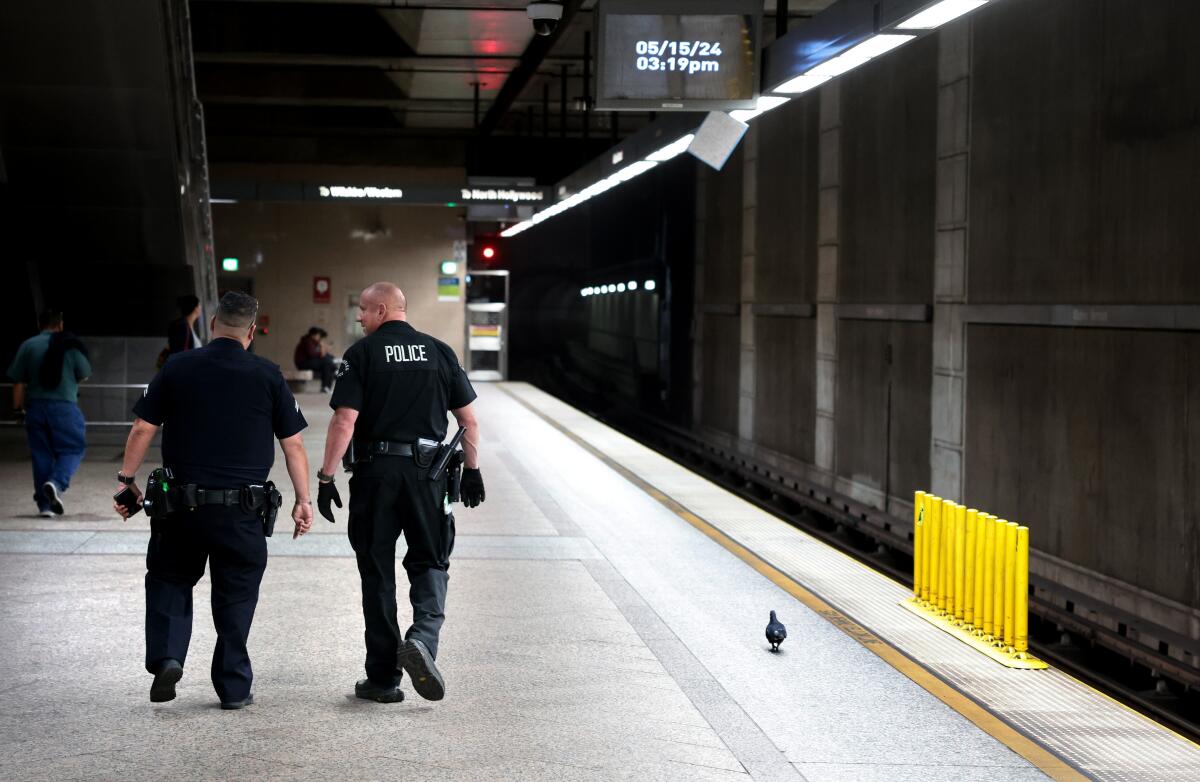
- Share via
Frustrated that too many people feel unsafe on its buses and trains, and dissatisfied with the law enforcement agencies that have been patrolling the system, Metro’s governing board will consider Thursday creating its own in-house police force.
While there are legitimate concerns about the cost and logistics of building a police department from scratch, including Metro’s ability to staff up at a time when agencies are struggling to hire officers, contracting for law enforcement service is not working well. It’s time to try a different approach. Metro is facing a doom spiral if it cannot make the system safer and increase ridership. An in-house police force is not a panacea for all the system’s ills, but rather one piece of a broader safety strategy that ensures riders feel comfortable and well served on L.A. public transit.
This isn’t a new idea. Metro, and its predecessor agency — the Southern California Rapid Transit District — had its own police department for years. Its officers were recruited, hired and trained specifically to deal with the code of conduct and quality of life issues that still make up the majority of bus and train rider complaints, such as homeless people sleeping on seats, people experiencing a mental health crisis, loud music, smoking, drinking and drug use.
Violent attacks on the Metro system have scared riders and present an existential threat to public transit in Los Angeles. Leaders have to make major changes to keep the system viable.
The in-house department was disbanded nearly 30 years ago in a shake-up that had as much to do with politics as public safety.
Then-Los Angeles Mayor Richard Riordan had promised on the campaign trail to hire 3,000 new LAPD officers. The city didn’t have the money to pay for the expansion, but the Metropolitan Transportation Authority did — revenue from a voter-approved sales tax increase in 1990 for transit. Riordan, along with then-Sheriff Sherman Block, led the effort to eliminate the transit police department and divide law enforcement duties, personnel and funding between the Los Angeles County Sheriff’s and Los Angeles Police departments, which would provide service to Metro through contracts.
At the time, proponents argued the arrangement would be cheaper and Metro would benefit from being served by large law enforcement agencies. However, some board members warned that Metro would lose the ability to decide how officers would be deployed, that transit security would be treated as a low priority and riders would suffer. That’s exactly what has happened, according to some board members.
It makes no sense to keep investing so much more in measures that haven’t kept transit safe than in ambassadors and other services endorsed by riders.
Metro has changed the contracts a couple of times over three decades and boosted funding to address declining ridership and passengers complaints about a lack of security. But even when the number of armed officers on the system was doubled, riders still complained about the lack of visible security, while drug use, disorder and violent crime spiked.
This is a critical moment for Metro. Voters have approved billions of dollars in sales taxes to expand the bus and rail system, which is supposed to be the backbone of L.A.’s “car-free” Olympics in 2028. But people will not ride or support public transit if they do not feel comfortable on the buses and trains.
Twenty-five participants in a journalism fellowship in L.A. used Metro buses and trains to get to multiple meetings a day for a week. Safely. Happily. And on time.
Chief Executive Stephanie Wiggins and staff have advocated for an in-house police force because it will give Metro full authority over all aspects of public safety. Currently, Metro directly oversees the ambassadors who provide customer service, the transit security officers who check fares and issue tickets for code violations, and the homeless outreach teams.
But policing is split between three agencies, and it will soon be four when the D/Purple Line stations open in Beverly Hills, which has its own police department. Metro leaders say they cannot monitor or even direct where and how officers are deployed, and that makes it harder to respond quickly to safety problems. Capt. Shawn Kehoe, who oversees the Sheriff’s Transit Services Bureau, said his agency has never told Metro “no” when leaders ask for help.
Metro leaders also argue that having an in-house police force would allow the agency to hire and train officers to be customer-and-care oriented. Mayor Karen Bass said she leans toward an in-house transit police agency because she wants Metro to create a public safety culture, “where it’s heavy on social services and the officers that come work for Metro are coming because they want to do something new, not where you’re trying to convince someone to unlearn what they’ve done for decades.”
That’s the right goal, but it is not an easy one. There are still unanswered questions that the governing board needs to grapple with.
The LAPD want to arm officers on the Metro system with the BolaWrap, a nonlethal lasso-like weapon. The plan awaits approval by the Metro Board of Directors.
Metro staff have recommended maintaining the same number of sworn personnel currently assigned to the system each day, which would require hiring more than 600 officers over five years, and increasing the number of ambassadors, homeless outreach workers and mental health clinicians, but projects this will cost less than the current contracts. Is this an achievable goal when the LAPD and Sheriff’s Department have been struggling to hire to the point that Bass and the City Council hiked LAPD pay and bonuses last year to help with recruitment? There’s also a shortage of social workers and mental health experts.
Is the timeline realistic? The 2028 Olympics fall in the middle of this five-year transition. How will that work out? And, transit equity advocates argue, the money for public safety hiring comes from Metro’s operations budget, so any increase in spending on police could decrease the money available for more frequent bus and trains.
After 30 years of contracting with outside law enforcement with mixed success, it’s time for Metro to look at new ways to keep riders safe and secure. This time, public safety should trump political considerations and the governing board should move forward with creating an in-house police force.
More to Read
A cure for the common opinion
Get thought-provoking perspectives with our weekly newsletter.
You may occasionally receive promotional content from the Los Angeles Times.
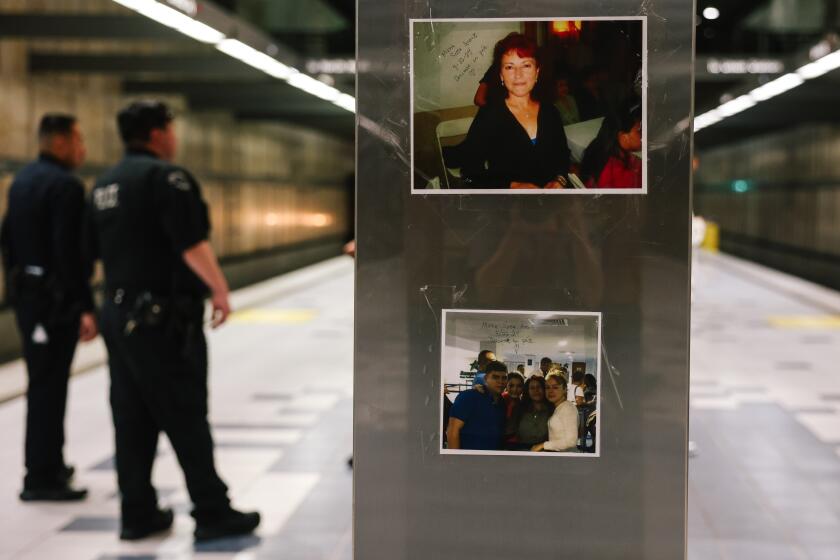
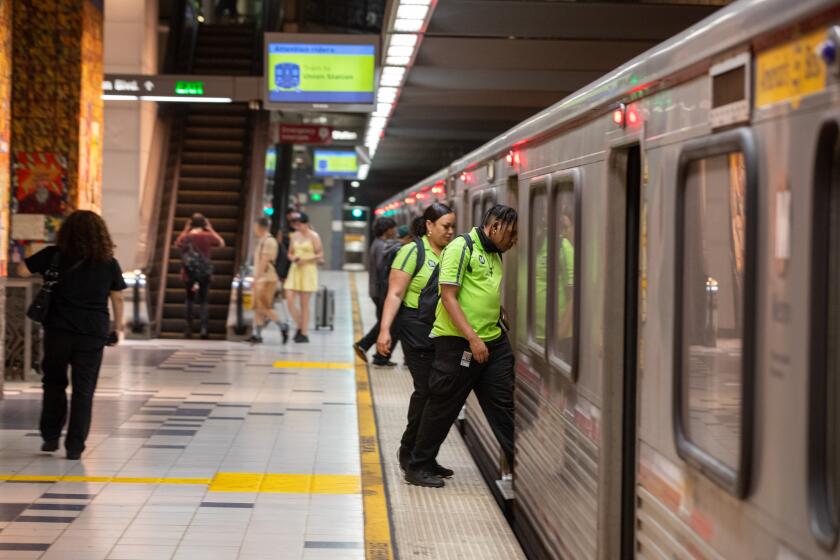
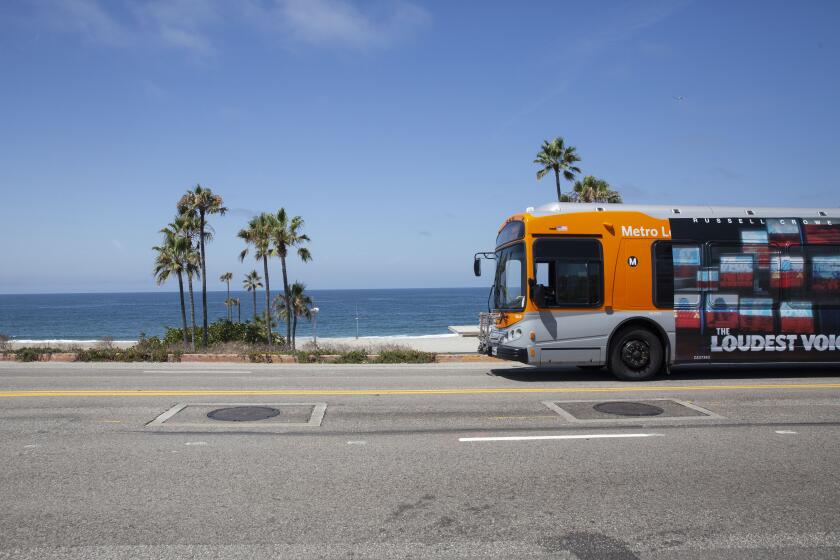
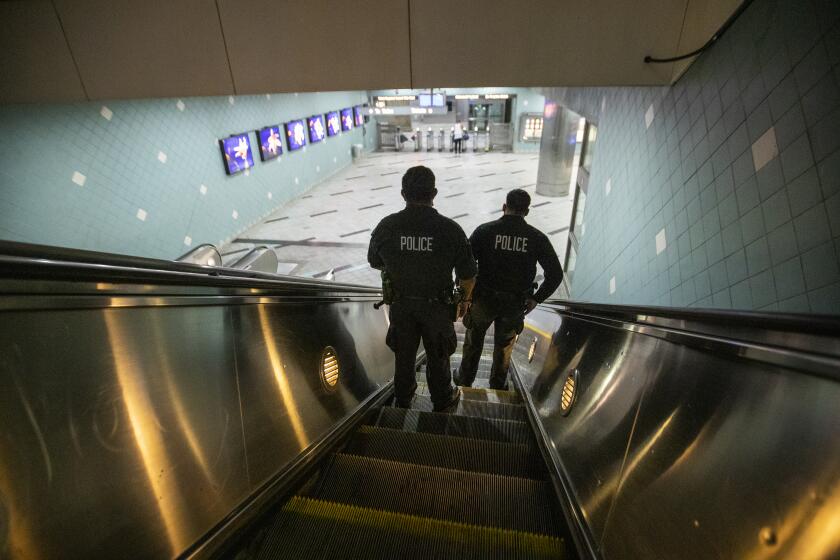


![Irvine, CA - July 16: Gina Osborn, shown at her home, is the former head of Metro security is suing the agency for firing her after she filed a claim with the Inspector General. Photo taken at her home Tuesday, July 16, 2024. Gina Osborn, a former FBI agent who was the agency's first chief safety officer, "was summarily terminated by [Chief Executive] Stephanie Wiggins," said her attorney, Marc R. Greenberg. Osborn says in claims that she butted heads with Metro's CEO over security as the agency was trying to put a good face on its efforts to clean up crime and loitering. (Allen J. Schaben / Los Angeles Times)](https://ca-times.brightspotcdn.com/dims4/default/c1419ae/2147483647/strip/true/crop/5981x4000+9+0/resize/320x214!/quality/75/?url=https%3A%2F%2Fcalifornia-times-brightspot.s3.amazonaws.com%2F46%2F07%2Fa88ac0b7466895ee4e137839d93c%2F1467168-me-former-metro-security-chief-18-ajs.jpg)



